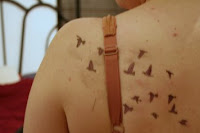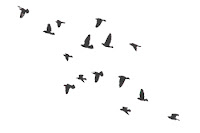There were a couple of interesting comments on that post yesterday, related comments, specifically about “just being” rather than working so hard to change, especially as related to gender.First, I want to clarify something. I was born female, socialized a girl, raised to be a ‘woman.’ Granted, I grew up in a somewhat small, live-off-the-land West Coast town where even the feminine women lean toward butch (boots and carharts rather than heels and skirts, that kind of thing) as well as with parents who dismissed many aspects of traditional gender roles, seeing the dichotomy as restrictive and limiting. But I was never the tomboy, never the one-of-the-boys girl. From the time I was about three or four up until second grade, I only wore dresses. As I got older I wore less and less female-specific clothing, but still was generally feminine. It took a conscious choice, conscious intention to develop my butch identity.
Let me say that again: this butch identity of mine is the result of hard work, because that is who I wanted to be. For the most part, I see it as something I perform on my body – the way I move, the clothes I wear, the way I cut my hair, the shoes I choose, the undergarments I choose. There are other aspects of it, behavioral aspects, primarily in the form of chivalry, opening doors, walking on the outside of the sidewalks, letting my girl order first (or ordering for her), the way I feel desire, flirt, and have sex (though that has a lot to do with my identification as a top, too). I don’t necessarily align certain personality qualities – i.e. writing, cooking, working on cars, interest in verbal processing, caretaking – to one particular gender identity or expression.
Of course, the reason that I wanted to adopt this identity at all was partly because of the way that I felt that it fit me, my body, my sense of self, the way I move through the world. Explaining my choice to develop a butch identity is fairly complicated (of course it is), but it also relates to the anxiety and depression that I felt as a teenager being completely paralyzed by the idea of being a fairly intelligent, articulate woman in the world, as I began to understand how women are treated, devalued, sexualized, used, and damaged. (Which is also why I pursued gender and oppression studies as an academic discipline.) My choice to become butch was related to my own sense of the ‘feminine’ as dangerous, in our society.
BUT: don’t get me wrong, I have done a fuck of a lot of work on my internalized sexism, and I understand – I REALLY UNDERSTAND – the value in femininity. But it took me a while, which is why it took me longer to admit (and understand) my attraction to and begin dating femmes than it did to figure out that I was/wanted to date women, and be butch. The third wave feminist movement has done some work on reclaiming “traditional” expressions of femininity (domesticity, Barbies, the color pink, glittery girly things, etc) but I think that hasn’t quite come to full fruition. (That’s another topic, I won’t go into it, though it’s related.)
So: when I decided that I wanted to intentionally adopt this butch identity, I also decided that there was only so much of it that I wanted. I didn’t want those stereotypical masculine traits that I see as damaging, limiting to the masculine gender (those that I mentioned yesterday – lack of emotional expression, inability allow help or ask for help, anger as the only acceptable emotion, valuing violence or the objectification of women).
Which is why I talked about cherry-picking my gender yesterday. And it isn’t as though this choosing of gender just happens once, and then is over – I’ve been developing this identity for five or six years now, made a serious study of it, a hobby, and I am still refining it, remaking it, reworking my performace of it on my body, the feel of it in my emotional inner life, the way I experience and express desire and am recognized by other butches (and femmes, and dykes) because of it.
Gender is policed socially – I constantly watch myself, or others do it for me. Other butches, other femmes, even other folks who refuse to limit themselves to the heterorestrictive gender binary system – at various times all sorts of people have said that I wasn’t “that butch” or “butch enough” or “really butch,” or they’ve pushed me to objectify a woman, tell me jokes about violence and sex and sports and cars assuming that I’ll get it and like it and laugh, as a form of bonding.
Somehow it is incredibly easy when developing a butch identity to adopt all those masculine traits that I would rather reject and not incorporate. I saw it happen with my group of young dyke friends as we were developing out of that awkward baby-dyke stage: we were all on the butch side of the gender spectrum, but they wanted to stare at pretty girls from across the bar, make lewd gestures, tell stupid (offensive!) jokes. I quickly developed the reputation as The Feminist, which of course meant “not butch,” as if the two things are mutually exclusive. I was teased constantly – one girlfriend of my best friend used to do things like slap my friend’s ass, and then glance at me sheepishly saying, “oops, sorry Sin, I didn’t mean to objectify her …”
Sigh.
I never could quite articulate the difference between sex and sexism, the difference between playfulness and objectification. I still grapple with all of this, but I feel much more confident in my understanding of my own personal gender identity and expression, and in gender in general.
Back to the comments, though: I’ll ignore the mention of my “gender identity issues” and just pretend that means “gender identity complexities” or something (’cause issues is a bit of a triggering word for me, I guess, implying that there are problems or negative behavior as a result).
I am actually very interested in the study of Buddhism in general, especially the concepts of a beginner’s mind, of staying clear and open, of calming the self and allowing things to flow through our bodies and minds. So “I just am the way I am” and allowing myself to “just be” really resonate with me, and my initial reaction is to be a little outraged: “of COURSE that’s how I address things!” But clearly, that’s not so true, not when it comes to Callie.
This is a place where Callie and I differ greatly. She is constantly remaking herself in opposition and reaction to what others around her need. She is always in flux. In some ways, she has very little self-definition and needs someone else to give it to her. That is not how I am, nor do I really understand it in its entirety.
This particular issue that I’m facing – of consciously working to get into and maintain an emotional space where I can have access to what I’m thinking and feeling, and what I need, and feel confident and safe enough to express that to Callie consistently – was one of the conditions upon which Callie and I got back together. She said she would work to make that space safer for me, and I said I would work to express my needs more often, so I wouldn’t go along like everything is fine when things aren’t, and then pull away seemingly suddenly (and cause her great pain, because of her great fear of abandonment and rejection).
So, I suppose the question of whether or not we’re going to be able to make those changes remains. I told her I would try it, and I am. The rewards of being with her are great, seriously great; I’ve never been in love like this before, I’ve never felt such great heights, I’ve never had this kind of physical connection with someone. This mini-crisis has reminded me that, if I want to keep her, and stay in this relationship, I need to keep this skill at the forefront of my mind a little more consciously, otherwise I am going to explode with anxiety and resentment.
I guess what I’m trying to say is that I can’t “just be” in this relationship – yet. She needs more from me than my own default and ingrained behavior can provide. (Just for the record, she is working really hard changing herself to better accomodate my needs too, in many very successful ways – she’s not only placing demands on me. I will write in depth about that another time.) I’m not used to that in relationships, but I love how much I am growing as a person, and I still suspect that it is going to be worth it, if we can sharpen our skills, sharpen our tools with each other, we can reach a serious state of bliss that will be sustainable, possibly for the rest of our lives.
And I’m not willing to give up that possibility just yet.

 Naked on the Internet: Hookups, Downloads, and Cashing in on Internet Sexploration by Audacia Ray
Naked on the Internet: Hookups, Downloads, and Cashing in on Internet Sexploration by Audacia Ray
